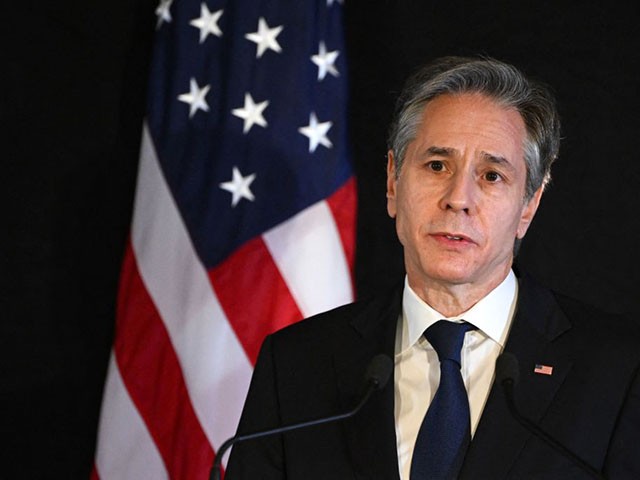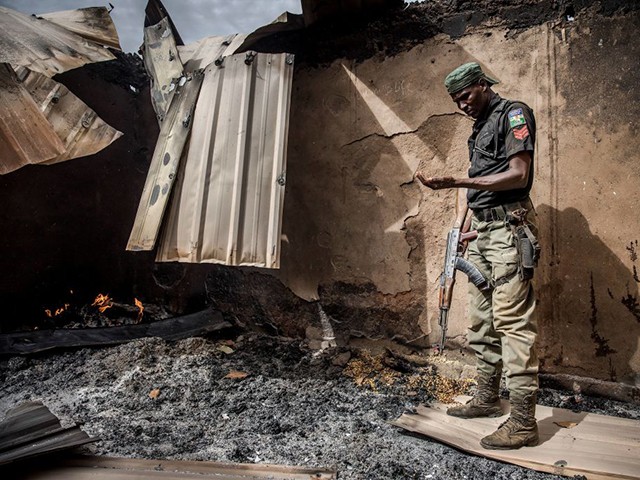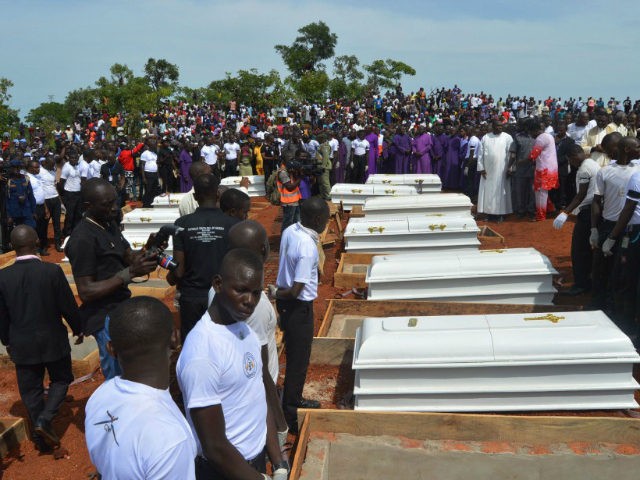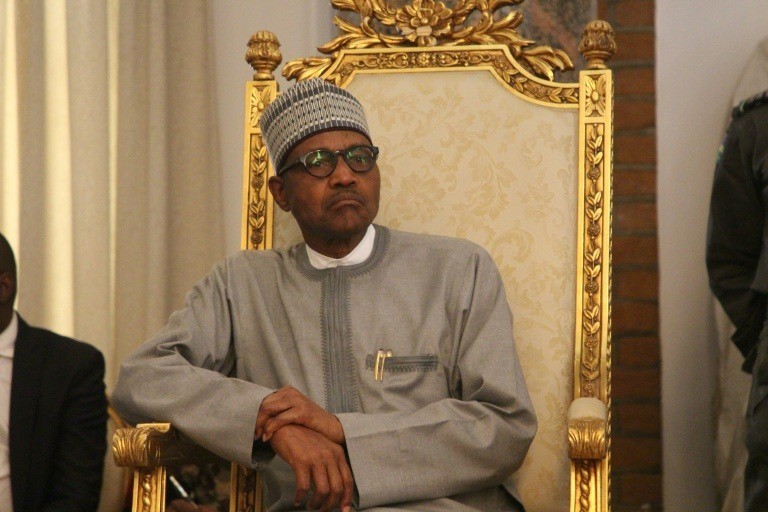The U.S. State Department released its annual Report on International Religious Freedom on Thursday. The report was tough on some countries, including the Chinese and Burmese genocides against the Uyghur and Rohingya Muslims respectively, but was remarkably dismissive of religious persecution against Christians in Nigeria.
The State Department report said “insecurity and violence increased” in Nigeria throughout 2021, “including in the predominantly Muslim North West, where expanded numbers of criminal groups carried out thousands of killings, kidnappings, and armed robberies.”
However, the report downplayed the significance of this violence as religious persecution, claiming it was “difficult to categorize many incidents as being solely, or even principally, based on religious identity.”
In cases where the State Department report decided it was not difficult to perceive the religious dimension of violence in Nigeria, it held all parties equally responsible:
According to a survey conducted by NGO Mercy Corps, a minority of the violence in the north of the country was interreligious, and both Christians and Muslims were perpetrators and victims.
The NGO stated that “rather than religious belief or animus, we find that intercommunal violence is largely driven by insecurity and a lack of trust between ethno-religious groups competing for political power and control over natural resources.”
The report also stated that “for a minority of northern residents … religious freedom remains a concern,” if indirectly, because fear of attacks created a fear of gathering in religious communities and “exacerbates tensions and mistrust between religious groups – the primary pathway to intercommunal conflict in the north.”
Christian groups were astounded in November 2021 when Secretary of State Antony Blinken decided to remove Nigeria from the list of countries that severely violate religious freedom. Blinken gave no reason for the delisting of Nigeria, leaving critics to speculate it was a political favor to the Nigerian government.

U.S. Secretary of State Antony Blinken gives a press conference in Geneva on January 21, 2022. (FABRICE COFFRINI/AFP via Getty Images)
Watchdog group Open Doors USA noted that Blinken mentioned the activities of infamous terrorist groups Boko Haram and the Islamic State West Africa Province (ISWAP), but avoided mentioning the Fulani militia, a jihadist operation that has arguably become more dangerous than either of the better-known terror gangs.
Open Doors USA described persecution in Nigeria as “brutally violent” because “Christians live their lives under the constant threat of attack from Boko Haram, the Islamic State West Africa Province (ISWAP), Fulani militants and criminals who kidnap and murder with few consequences.”
Boko Haram rebranded as ISWAP in 2015, but the Nigerian government insists the two groups remain distinct.

A Nigerian Police Officer patrols an area of destroyed and burned houses after a recent Fulani attack in the Adara farmers’ village of Angwan Aku, Kaduna State, Nigeria on April 14, 2019. (LUIS TATO/AFP via Getty Images)
Open Doors CEO David Curry told Breitbart News on Thursday that the government of Nigerian President Muhammadu Buhari, who is a Fulani Muslim, has been suspiciously passive against the abuse of Christians, including the horrifying recent case of a female Christian college student named Deborah Yakubu who was accused of blasphemy by a Muslim mob, stoned to death, and incinerated.
“It just kind of highlights yet again that this country of Nigeria is tolerating and allowing these extremists to attack Christian groups, villages, individuals, for nothing more than their Christian faith,” Curry said of Yakubu’s murder.
Curry noted the Buhari government sometimes goes through the motions of protecting Christians and their places of worship. “They’ll sometimes send military folks out, they may not even give them bullets for their guns,” he said.
While the State Department religious freedom report focused on religious violence in northern Nigeria, Open Doors USA pointed out that Fulani militants are active in the south as well, and they are fiercely determined to methodically wipe out Christian villages.
Fulani militants armed with AK-47 rifles attacked a Christian village on May 6, killing eight people. Christian community leaders said the attack was part of a “program of sending our people away from our lands so that they can expand their grazing areas, then occupy the lands.”
“Despite an early warning, we told government officials, but they kept silent and allowed Fulani militants to kill us. The government is silent over the killings in my region because we are Christians, not Fulani Muslims,” one community leader charged.
Another watchdog group, International Christian Concern, named Nigeria its “Persecutor of the Year” for 2021, describing the jihadi campaign against Christians in the Middle Belt region as “a 20-year genocide.”
“Where is any action? The Nigerian government gives these attacks lip service without any meaningful response. Where is the outcry?” asked ICC President Jeff King.
“In the Middle Belt, there’s hardly a month that passes without a big or small attack. These attacks are carried out by Fulani herdsmen and militia who are predominantly Muslims. Churches have been destroyed or vandalized in some of these attacks. The pattern of the attacks shows that they are often well coordinated,” the ICC’s Addison Parker said in April.
The State Department report actually tried to absolve the Fulani of many attacks attributed to them, arguing they were instead the work of “local armed criminal groups of various ethnicities.”
The report mentioned accounts that “Muslim herdsmen killed at least 49 persons and abducted 27” but described only one incident, the murder of Pastor Leviticus Makpa in June.
Aside from the argument that many Fulani attacks were actually perpetrated by random criminals, this was the only mention of the Fulani in the report.
In a video conference on Tuesday, Nigerian Archbishop Matthew Man-oso Ndagoso described religious persecution in Nigeria as “systematic” and getting worse.
The archbishop was unsparing in his criticism of Christian herdsmen for their share of the violence, and for lamentably escalating conflicts with Muslim neighbors into religious conflicts, but he listed several reasons why the persecution of Christians looms so large in Nigeria — including an influx of Libyan weapons across the weak border after the Obama administration toppled dictator Moammar Qaddafi and the growing alliance between criminal gangs and Boko Haram.
Ndagoso noted that Boko Haram is providing weapons to bandits and using them as footsoldiers for its Islamist crusade. He mentioned that bandits have developed a predilection for kidnapping priests for ransom because they think “churches are more likely to pay for their safe return.”
“Who should be blamed? The government. Securing life and property is the government’s prerogative, either because they were elected to office or they got to it over the barrel of a gun. But our system has failed, it has collapsed,” he said.
Ndagoso mentioned the Fulani menace and said their greed made them as dangerous as their religious convictions because they do not really care who they must kill to seize land they desire.
“People are not pursued with a knife all the time, but there are unwritten laws that limit Christian’s freedom to practice our religion. You are not free to get land, pay for it, and build a church on it. Pastors are not free to preach the Gospel, and no Christian teaching is allowed in public schools, while Islam is taught with state funds,” he pointed out.



COMMENTS
Please let us know if you're having issues with commenting.